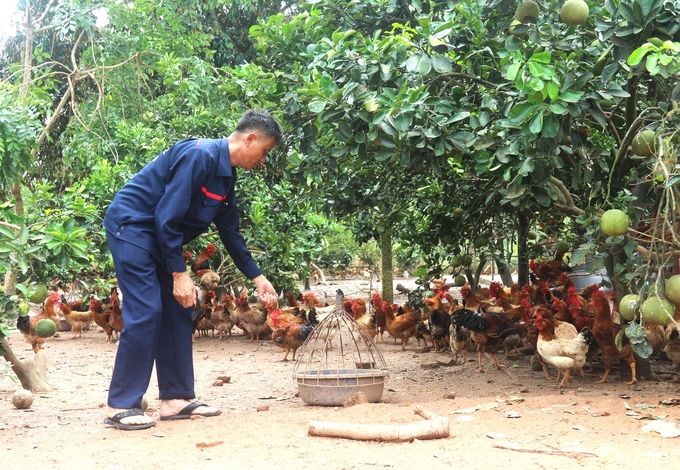November 27, 2025 | 19:28 GMT +7
November 27, 2025 | 19:28 GMT +7
Hotline: 0913.378.918
November 27, 2025 | 19:28 GMT +7
Hotline: 0913.378.918

Phu Binh District (Thai Nguyen Province) is rapidly expanding its local livestock production models that focus on biosecurity. Photo: Pham Trung.
As one of the regions with the largest livestock population in Thai Nguyen Province, Phu Binh District has adopted livestock production practices that focus on biosecurity on a large scale to protect both public health and animal welfare.
The district has utilized provincial support for disease prevention measures and local funding for vaccination programs. Furthermore, it organized training sessions on advanced farming techniques and procedures in addition to developing VietGAP-compliant livestock production models that focus on biosecurity.
At present, out of over 160 farms and family-run operations in the district, 70% are engaged in biosecure livestock production. Notably, ten facilities have been awarded the Disease-Free Livestock Certification, and 18 have met VietGAP standards.
With the aim of further promoting Phu Binh's strengths in livestock production, the district will receive annual support from Thai Nguyen province, with a budget allocation of 3 to 4 billion VND for vaccination campaigns against avian flu, pasteurellosis, swine fever, foot-and-mouth disease, and porcine reproductive and respiratory syndrome in poultry and pigs.
On the other hand, Phu Binh District plans to continue developing disease-free livestock production models and coordinating closely with local communes and towns to provide local residents with instructions on the correct disinfection process for their barns. The district will also monitor the development of disease outbreaks to promptly detect and prevent the emergence and spread of pathogens within the region.
Translated by Nguyen Hai Long

(VAN) According to Mr. Vo Minh Thanh, Director of the Tay Ninh Department of Agriculture and Environment, Resolution 57 has created a new development pathway for the locality, shifting from traditional toward modern agriculture.
/2025/11/26/4909-2-154329_878.jpg)
(VAN) Pearl grouper farming in HDPE cages not only delivers economic efficiency but also contributes to protecting the environment, creating jobs, and promoting marine-based experiential tourism.

(VAN) The model of making a living under the forest canopy through the agroforestry system in Van Son commune, Bac Ninh province, is expected to generate an annual income of approximately VND 30 million/ha.

(VAN) Many enterprises in Can Tho are harnessing natural energy and reducing greenhouse gas emissions in their production processes, thereby contributing to the promotion of a sustainable green transition.
/2025/11/24/3536-2-112800_176.jpg)
(VAN) Dong Nai now has tens of thousands of hectares of forests certified for sustainable management, and this area will continue to be expanded in the coming period.

(VAN) Vinh Ha hamlet (Dai Xuyen commune, Hanoi) is shifting away from small-scale farming as households adopt bioscurity into their breeder chicken models.

(VAN) Heavy rains make aquatic species more vulnerable to disease. Proactive water management and high-tech systems help farmers prevent outbreaks and protect yields.